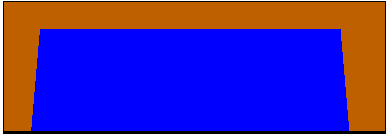
![]()
(these will mostly be suggestions for amateur theater groups)

![]()
(these will mostly be suggestions for amateur theater groups)
Well, this finally a good place to mention 2 theater projects which we realised with the group "Shaw-shock" and which I think are worth considering in case you have a theatre group and are looking for some fun. The first one takes cca 20 min (depends on how many members your group has) and consists in the following. Every member of the group is assigned certain action which he/she periodically performs on stage. For instance when we staged this I played a drunk who staggered on the stage with Vodka in his hands, sat down at the table, sipped 3 times from the bottle and left. Other people acted out a couple kissing on a sofa, an electrician fixing the bulb (and being mildly electrocuted during the process), a housewife sweeping the floor ...you get the picture. After each appearance we would spend some 10-30 seconds backstage and then on to a new cycle. The point is that everybody's action takes some specific time and the times of different people differ. Now throughout the play everybody does his/her action absolutely independently on others and with exact timing. The play begins with the first member who starts his cycle. After say 2 cycles second member joins in, then third and so on so that after cca 5-10 minutes the stage is full of 10-15 different actions that periodically pass in front of spectators' eyes. It sounds boring, but the fact that periods of the actions are different makes it actually visually very interesting (at least that's what we were told) and if the actions are well chosen it can be funny too. After some time (depends on the director ;-) people will stop doing their actions in the same order in which they began - that is the guy who entered the stage first is the last one whose cycle is terminated. It is needless to say, that the whole performance can be enhanced by a carefully selected music or even a spoken word (like some really boring passages from mechanical engineering textbooks)
The second project came kind of out of necessity when we decided to stage G.B. Shaw's "Glimpse of reality" which had only 4 characters and we were 7 actors at that time. So we divided the stage into 2 halves (by a piece of an old volleyball net) and decided to play the same piece twice each night. One half of the stage belonged to the "free section", whose purpose was to twist the play as much as possible, and the other to the "classical section", which tried to play the text as faithfully as possible. Both groups had 3 members and the last guy (we were 7) was shared so during the performance he kept switching sides depending on which side of the stage was lit (that is which group were just performing). He had 2 hats, one for the "classical" part and one for the "free" version and he would swap them each time he changed the section. And so during one evening the audience saw that piece twice, played by two different groups alternately (we switched every 10-15 min). That itself would be somewhat boring, of course, and so for the "classical section" we used the standard translation of Shaw's text, while for the "free section" we used our own verbatim translation. And verbatim means that we translated the text word by word from English to Czech, no matter whether it made sense or not. In addition to it the "free section" was allowed all kinds of improvizations and stage tricks (for instance at some point we would eat spaghetti on stage and we had one guy from the audience joining us for the meal; this guy would chat with us for a while and then go back). Finally in 2 places where the verbatim translation wasn't funny enough we performed in both groups simultaneously - which, of course, required some synchronization, but it worked out very well - sort of like synchronized ballet. Had G. B. Shaw seen our performance he might not have lived so long, but we had our fun and so had the spectators, the "free section" taking care of their entertainment and the "classical section" explaining to them what they just saw twisted beyond recognition. Occasionally, just to break the stereotype, it was good to change the order of performance. We let the "classical" guys play first and make a parody of their effort afterwards in the "free section".
Here is a scheme to produce amusing and quite bizarre plays. We used to do this in college when we got slightly drunk, but I think it's got its potential in the era of the Internet. First the coordinator selects, say 5 people that will act as characters A, B, C, D and E. Those 5 people actually write the piece and they do so in such a manner that everyone sees at any time only the previous line of the script. Let's say that A begins. Coordinator then sends his part to B, who writes his. Coordinator then sends only B's reply to say D, who writes his/her part and sends it back to coordinator. He then adds D's part to the text and sends ONLY D's line to, say C. Thus C sees only D's part and has no idea what A or B have said. Coordinator then keeps sending the text randomly to A-E so that noone sees more than the very last line of the text. This produces a lot of funny situations and one day, when I have time I'll try this on the Internet. In the meantime, you can give it a try.
Here is Cimrman's "Ten Commandments for Good Actors" translated from
Smoljak&Sverak's rendition of Cimrman's drama "Vlasta" (presented
in the play "Zaskok" by the Theater of Jara Cimrman):